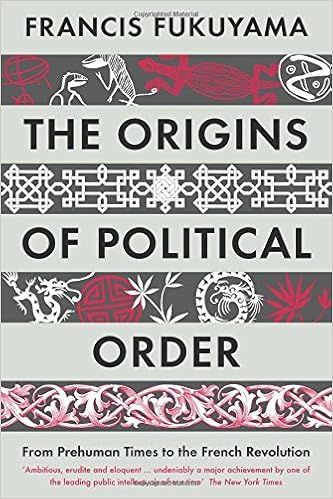Francis Fukuyama did a great service by reminding us that in the beginning, humankind was necessarily clannish. We are social creatures surviving only in groups, but there is no celestial police force guarding each one of us. If we don't stick with our kin, some other group will make us toast (in the baleful meaning of that phrase).
This argument was developed in the excellent "The Origins of Political Order: From Prehuman Times to the French Revolution" - I quote from this review (my emphasis):
"The Origins begins at the beginning with human evolution. This is no mere prolegomena. Fukuyama deserves credit for emphasizing that we are political animals and that evolved human nature is a basic influence on politics. Gathering evidence from a variety of sources – studies of chimpanzees as well as reports from the political life of hunting and gathering bands – Fukuyama proposes that humans have four key natural dispositions most relevant to politics. We evolved to be nepotistic, most inclined to cooperate with kin. We evolved to be religious; we evolved to be norm-followers; and we evolved to seek status or recognition.In the west we are so socialised into an atomised mode of life, mediated only by the nuclear family, that we see kin-groups (clans and gangs) as profoundly primitive and 'other'. But our way of life depends upon the integrity of a strong state exerting 'just power' through depersonalised laws. And a lot of conscious inhibition of retributive impulses.
"A particularly illuminating element of the book is how these evolved dispositions have continued to be influential. Nepotism, or kin selection, as expressed in strong tribal or clan lineages, is a continuing theme in the book as the nemesis of the modern state. If tribalism is strong, as today in Afghanistan or the Sunni Triangle of Iraq, modern states cannot flourish.
"The importance of religion as an influence on political development is another theme throughout. It was from religion, Fukuyama argues, that the rule of law arose.
"The key role of norms and institutions provides the subject-matter of the book: political institutions. Fukuyama regards the desire for status or recognition as the main source of change in history, and he engages in a running dispute through the book with rationalist or rational-choice explanations. Though Fukuyama uses a bio-historical and bio-political approach, he is by no means a ‘biological determinist’. Biology he treats as probability not determination.
"After briefly describing the transition from foraging to agriculture and then the development from bands to tribes to chiefdoms to states, Fukuyama turns to his main concerns: (i) the origins of the modern state – in ancient China; (ii) the origins of the rule of law in the realms of powerful religions: India, Islam, and Christendom, but not China; and (iii) the origins of accountability in the assemblies of medieval Europe, especially the English parliament.
...
"Fukuyama makes the useful point that state-building requires overcoming the strong bonds of kin. States were recurrently prone to being colonized by their officials’ nepotism (favouring their relations), dynasticism (seeking to have their offspring inherit their office), tribalism, and clannishness.
"One method of bypassing kinship was to recruit military slaves. This was a common ploy in Islam and resulted in such bodies as the Ottoman Janissaries. Another was to rely on eunuchs, who were biologically prevented from founding their own mini-dynasties within the apparatus of the state. A third was to recruit officials on the basis of competence or merit. This, Fukuyama argues, was China’s main innovation.
"Europe was unusual: before state-building got underway, the Church had already weakened extended lineages (except in peripheral areas, such as Highland Scotland with its clans) with its ban on cousin-marriage. The bonds of extended lineages had already diminished prior to European state-building."
Erode that state, or let it collapse, and the only individualists left will be dead individualists.
---
Now continue to Human Dodos.

No comments:
Post a Comment
Comments are moderated. Keep it polite and no gratuitous links to your business website - we're not a billboard here.